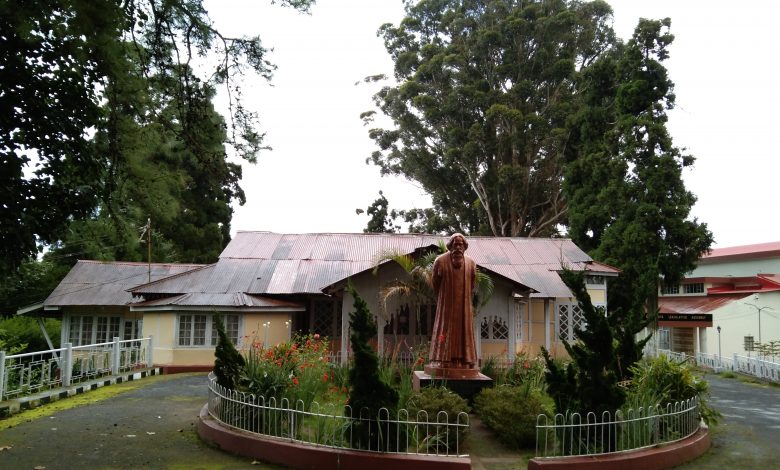Tagore, a great child psychologist

Uma Purkayastha
Rabindranath Tagore was not only a great poet, novelist, dramatist, story writer, painter, lyricist and social reformer, but also a great educationist and a keen child psychologist. Prior to Tagore, no poet or writer of Bengal contributed so much to children’s causes.
Tagore was much sympathetic towards children. He studied their minds thoroughly and presented their thoughts and feelings in his writings. His feelings of sorrow and pain and bitter experiences of his childhood days are reflected in his writings on child psychology. He lost his mother in his boyhood; and the pain he suffered for his departed mother is expressed in many of his compositions through feelings of the children.
His poems in the books, Shishu, Shishubholanath, Khapchara, Chorai Chabi etc are purely reflections of child psychology.
In his poem Sesh Chithi, Tagore expressed the pain and trauma of a little girl Amala who had lost her mother, and the father became her only source of affectionate shelter and dependence. Her aunt came from Banaras to visit them, and noticing Amala’s negligence in studies and at the same time the affectionate indulgence of her father, she decided to separate Amala from her father for greater interest. Little Amala expected till the last moment that her father would not agree to part with her, but was shocked to see her father’s silence. The father was helpless despite his extreme negativity.
The aunt took Amala to Banaras against her will, and admitted her in a school- hostel. The girl’s trauma of being separated from her beloved father is vividly portrayed in the poem. Unfortunately, the girl died of fever in the hostel within a short period. Being informed of her serious illness, the father rushed to the hostel, but everything was over by then. He had to take back all her belongings from the hostel, and he found a half-written letter in childish handwriting, in her box, which read as, ‘Daddy, I am very much longing to see you’ (Baba tomake dekhte boddo ichha korche).
Here is the end of the story, which touches every parent’s heart.
In the short story Chuti (The Holiday), Tagore drew the picture of Phatik, a lively young village boy of 13 who was sent to Calcutta to his uncle for education by his widowed mother. Phatik dreamt of a city life, and when his uncle proposed to take him to Calcutta to study there, he was overwhelmed with joy. But his dream and enthusiasm were crippled when he faced the realities of city life.
Phatik could realise that he was a burden on his aunt. The heartless rude attitude of his aunt, the cruel mockery of his cousins, as he was a village boy; and the inhuman beatings of the teachers in school made him disillusioned. Helpless, Phatik felt suffocated in that bitter atmosphere of city life and desperately thought of going back to the village to his affectionate mother.
The uncle assured him to take back to his mother during the next holidays. Phatik, while counting days impatiently to see his mother, suddenly got high fever. The helpless boy could feel ardently the immediate necessity of his beloved mother. One night, ignoring storm and rain, Phatik fled away with the determination to reach his mother. But the next morning, he was found lying unconscious by the side of a river. The police escorted him to his uncle, where he breathed his last, muttering in delirium – ‘Mummy, I have got my holidays! I am coming home.’
This trauma and pain of a boy like Phatik is universal. Other than a mother, nobody can feel the pulse of a child. Parents are the only shelter for children, even the delinquents. Phatik would not have died had he got the touch of motherly love and affection from his aunt in Calcutta. He felt helpless and suffocated in that unkind heartless atmosphere of his uncle’s house; and his mind was fluttering like a caged bird. This cry and depression of a child is universal and the poet could depict very emotionally and devoutly. Phatik’s last muttering in delirium is echoed with pain to the universal motherhood. It is eternal!
The most successful drama on child psychology of Tagore is Dakghor (The Post Office). The little boy Amal was ailing for a long period and was advised by the village physician not to go out of is room. He was kept confined to bed. Looking at the window, he would imagine how he could reach the other village, how he could send a letter to the king to come and see him. The curd-seller felt pity on him and gave him curds to eat. The window was the only source of joy, open field and blue sky. But the Kaviraj (physician) advised to close the window so that he should not get cold. Amal’s mind revolts. He wants open air, light and sky.
Ultimately Amal died of mental suffocation. His last desire was that he would request the king to make him his postman so that he could deliver his messages form door to door, from village to village.
This drama is appealing and has been appreciated far and wide. It has been translated into different languages and staged in many western countries. In the preface of the English translation of the drama, WB Yeats wrote —
“When the little play was performed in London, a year ago the Irish players, some friends of mine discovered much detailed allegory. The deliverance sought and won by the dying child is the same deliverance which rose before his imagination. Mr Tagore said, When once in the early dawn he heard, amid the noise of a crowd, returning from some festival, this line out of an old village song, ‘Ferryman, take me to the other shore of the river’. It may come out at any moment of life, though the child discovers it in death.”
On the stage, the play shows that it is perfectly constructed, and conveys to the right audience in emotion of gentleness and peace.
Tagore’s appeal on child psychology is eternal and his contribution towards children, his thought and ideology on child education, are of universal approach. He could realise that children are the budding hopes of the nation; and hence they should be given the liberty to be bloomed freely. As a great educator and educational reformer, he was against physical punishment to school children. Children should be taught with cheer and pleasure through creativity; and the teacher should be always sympathetic to students; that was his principle (‘Siksha’ Sankalan).
His great creation ‘Shantiniketan’ was based on that principle of child psychology. Children are given the liberty to move freely and to be taught amid nature.
The International University (Viswa Bharati) which he founded at Shantiniketan is his lasting monument which is open to children of the whole world, and where his message ‘Give and take and be united’ gets a real shape.
(The author is an educationist and has penned several books on Rabindranath Tagore)





